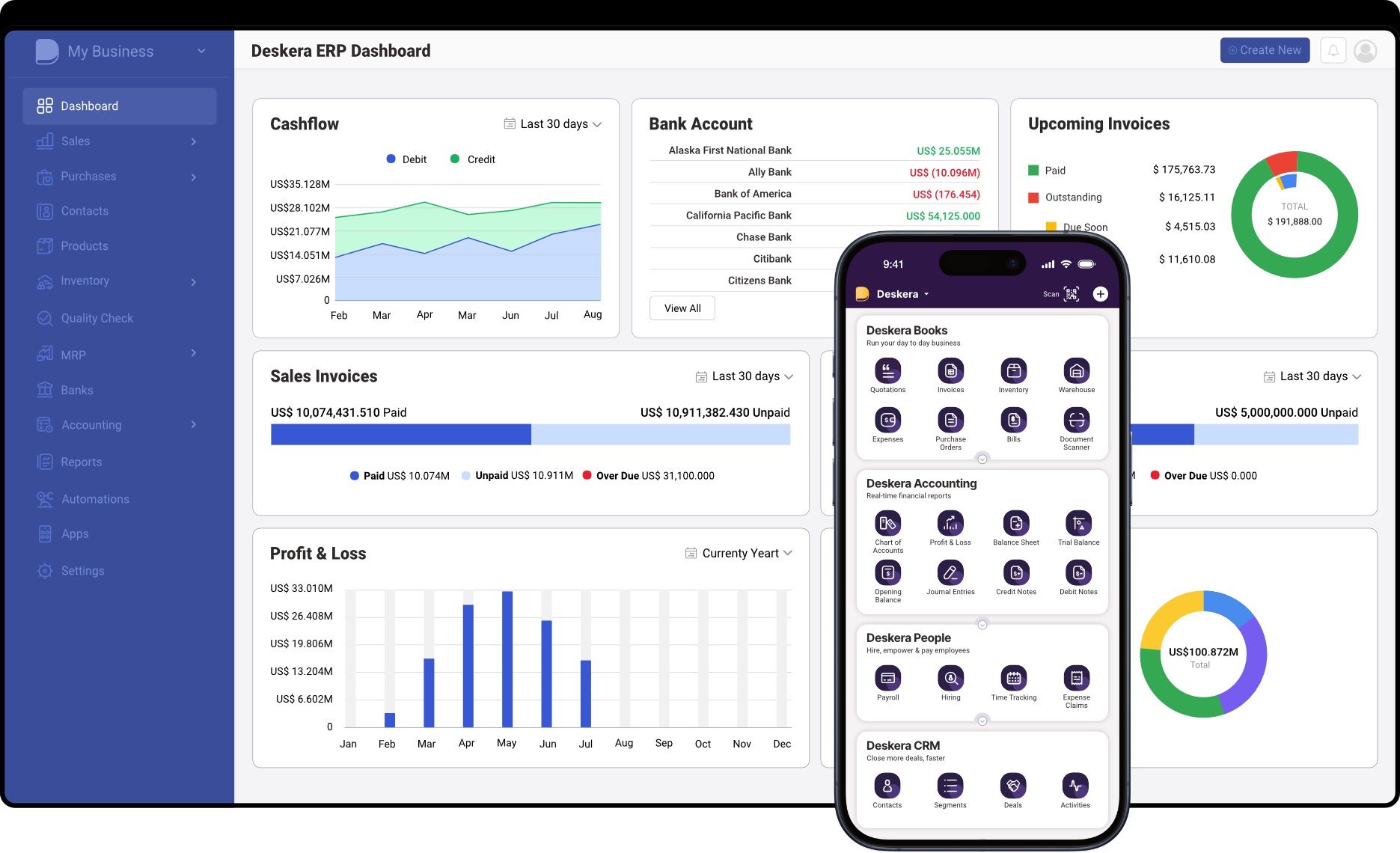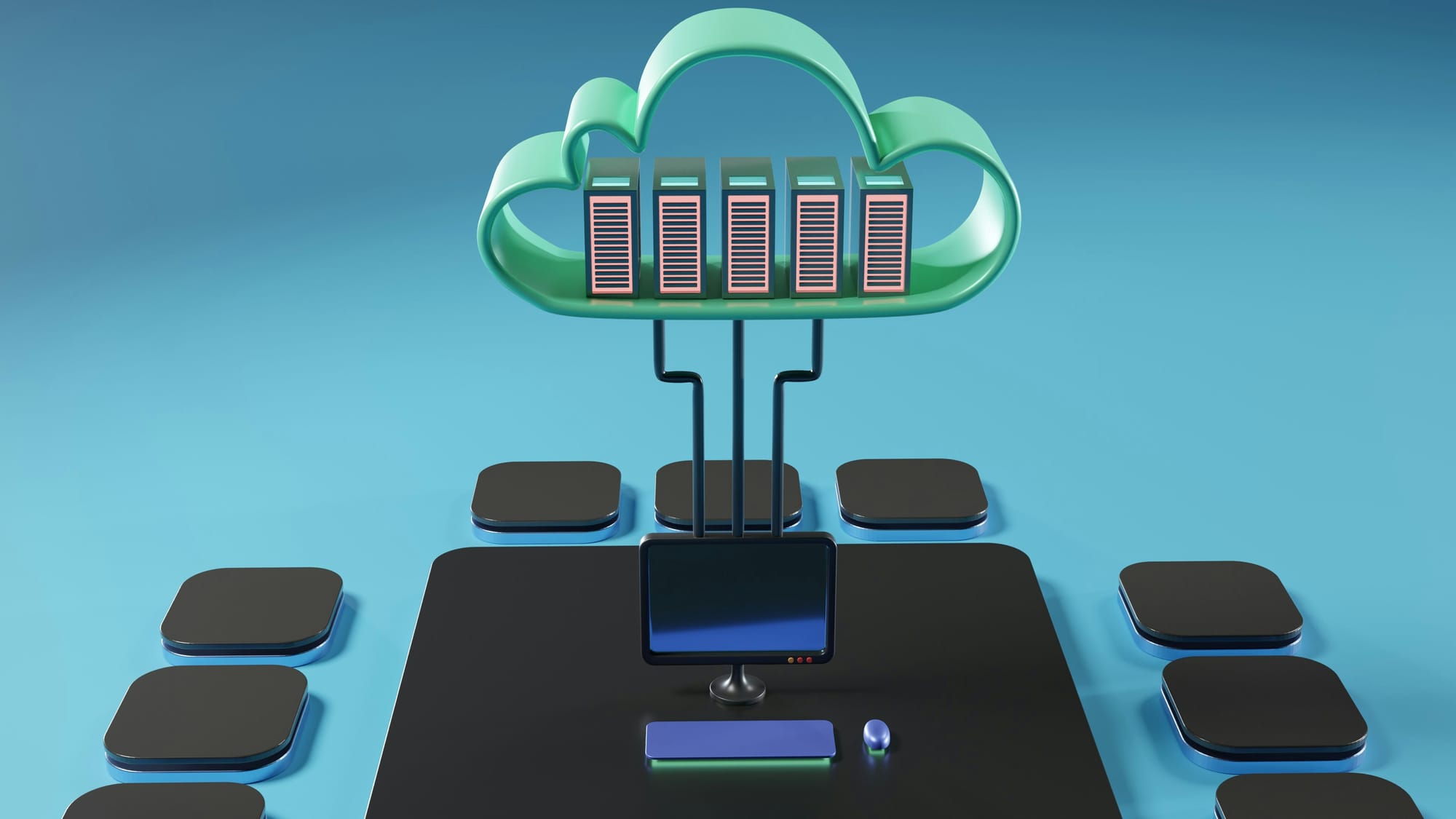In the rapidly evolving landscape of manufacturing, the adoption of advanced software solutions is paramount to maintaining competitiveness and operational efficiency.
The global manufacturing operations management software market was estimated at USD 16.26 billion in 2023 and is expected to grow at a CAGR of 13.8% from 2024 to 2030 (Source: Grand View Research). This significant growth underscores the increasing reliance on technology to streamline manufacturing processes, enhance productivity, and reduce costs.
One notable player in this arena is Deskera ERP. Known for its comprehensive suite of features tailored for manufacturing businesses, Deskera ERP offers robust solutions for inventory management, production planning, and financial reporting.
Its user-friendly interface and cloud-based platform make it an attractive choice for small to mid-sized manufacturers looking to optimize their operations without the complexity and high costs associated with traditional ERP systems.
As we explore the top manufacturing software solutions available today, we'll delve into the unique features and benefits of each, providing insights into how they can transform your manufacturing processes and drive growth in the years to come.
The Need for Manufacturing Software and the Challenges They Help Solve
In today's competitive industrial landscape, the best manufacturing software systems have become indispensable for businesses aiming to streamline their operations and stay ahead of the curve.
The integration of the best ERP software for manufacturing into everyday processes addresses a multitude of challenges, ensuring that manufacturers can operate efficiently and effectively.
Key Challenges and Solutions
Complexity of Operations
- Solution: The best manufacturing software simplifies complex operations through automation and integration. For example, the best manufacturing ERP software consolidates data from various departments, providing a unified view of operations and facilitating better decision-making.
Inventory Management
- Solution: Effective inventory management is critical for avoiding stockouts and overstocking. The best manufacturing software for small business includes robust inventory management modules that automate reorder processes, track inventory levels in real-time, and optimize stock management.
Production Planning and Scheduling
- Solution: The best ERP for manufacturing industry helps in detailed production planning and scheduling. These systems can forecast demand, allocate resources efficiently, and minimize downtime, ensuring smooth production runs.
Quality Control
- Solution: Maintaining high-quality standards is essential in manufacturing. Manufacturing software examples, such as quality management modules within ERP systems, help monitor production quality, conduct audits, and ensure compliance with industry standards.
Cost Management
- Solution: Low cost manufacturing ERP software provides small and medium-sized enterprises with affordable tools to track expenses, manage budgets, and optimize costs without compromising on functionality.
Data Management and Analysis
- Solution: The best manufacturing software in India and globally offers advanced data management and analytics capabilities. These tools help manufacturers analyze production data, identify trends, and make informed decisions to improve efficiency and productivity.
Scalability and Flexibility
- Solution: As businesses grow, their software needs to scale accordingly. Top 10 manufacturing ERP systems are designed to be scalable and flexible, allowing manufacturers to add new functionalities and adapt to changing business needs without significant disruptions.
By addressing these challenges, the best manufacturing software for small business and large enterprises alike enables manufacturers to enhance productivity, reduce costs, and maintain high-quality standards.
Investing in the best manufacturing ERP software is a strategic move that can drive significant improvements in operational efficiency and business performance.
10 Best Manufacturing Software
If you want to enhance the productivity and profitability of your manufacturing processes, then you must consider these top 10 manufacturing software.
Deskera ERP

Deskera ERP is a cloud-based enterprise resource planning (ERP) solution designed to cater to the needs of small to mid-sized manufacturing businesses. Known for its comprehensive suite of features and user-friendly interface, Deskera ERP helps businesses streamline their operations, improve efficiency, and enhance productivity.
The software offers robust capabilities in inventory management, production planning, financial management, and more. With its modern technology stack and extensive functionalities, Deskera ERP stands out as one of the best ERP software for the manufacturing industry.
Key Features
- AI-Assistant David: Deskera ERP includes an AI-powered assistant named David, which helps automate tasks, provide insights, and streamline operations through natural language processing.
- Mobile Accessibility: Deskera ERP offers full mobile accessibility, allowing users to access the system and perform tasks on the go from any device with internet connectivity.
- Business Intelligence: The software provides powerful business intelligence tools, offering real-time insights and analytics to support decision-making and strategic planning.
- Inventory Management: Deskera ERP offers real-time tracking of inventory levels, automated reordering, and detailed inventory reports to help businesses maintain optimal stock levels.
- Production Planning: The software provides advanced production planning tools, including demand forecasting, BOM management, work order management, WIP tracking, and production scheduling.
- Machine Maintenance: Deskera ERP includes features for managing machine maintenance, ensuring optimal performance and reducing downtime.
- Ad Hoc BOM: The software allows for the creation of ad hoc BOMs (Bill of Materials), providing flexibility in managing production processes.
- Financial Management: Comprehensive financial management features include general ledger, accounts payable and receivable, budgeting, and financial reporting.
- Supply Chain Management: Deskera ERP helps businesses streamline their supply chain processes, from procurement to delivery, ensuring timely and efficient operations.
- Human Resources: The software includes HR modules for payroll processing, employee management, and performance tracking.
Pros
- Comprehensive Functionality: Deskera ERP offers a wide range of integrated modules, covering all aspects of manufacturing operations.
- AI-Powered Assistance: The AI-assistant David automates tasks and provides valuable insights, enhancing operational efficiency.
- User-Friendly Interface: The software is designed with a user-friendly interface that simplifies navigation and reduces the learning curve for new users.
- Mobile Accessibility: Full mobile accessibility allows users to perform tasks and access information from anywhere, enhancing flexibility.
- Customization: Deskera ERP is highly customizable, allowing businesses to tailor the system to their specific needs.
- Real-Time Insights: The business intelligence tools provide real-time insights and analytics, enabling informed decision-making.
Cons
- It does not offer features to support document management.
Oracle NetSuite
Oracle NetSuite is a leading cloud-based ERP solution widely recognized for its robust functionalities and scalability. It caters to businesses of all sizes, including large enterprises and small to mid-sized manufacturers.
NetSuite provides an integrated suite of applications that cover financial management, supply chain operations, customer relationship management (CRM), and more.
Key Features
- Financial Management: NetSuite offers comprehensive financial management tools, including general ledger, accounts payable and receivable, tax management, and financial reporting.
- Inventory and Order Management: The software provides advanced inventory tracking, order management, and procurement functionalities to ensure optimal stock levels and efficient order processing.
- Production Management: NetSuite supports manufacturing processes with features like BOM management, work orders, production scheduling, and shop floor control.
- CRM: NetSuite includes CRM capabilities to manage customer interactions, sales automation, marketing campaigns, and customer support.
- Supply Chain Management: The software helps businesses optimize their supply chain operations, from procurement to delivery, with real-time visibility and analytics.
- E-commerce Integration: NetSuite seamlessly integrates with e-commerce platforms, facilitating online sales and order processing.
Pros
- Comprehensive Functionality: NetSuite offers a wide range of integrated applications, making it a one-stop solution for various business needs.
- Scalability: The software is highly scalable, accommodating the growth of businesses from small enterprises to large corporations.
- Real-Time Visibility: NetSuite provides real-time insights into business operations, enabling informed decision-making.
- Cloud-Based: Being cloud-based, NetSuite offers flexibility and accessibility, with reduced IT infrastructure costs.
- Global Reach: The software supports multi-currency, multi-language, and multi-subsidiary operations, making it suitable for global businesses.
Cons
- Cost: NetSuite can be expensive, especially for small businesses or startups with limited budgets.
- Complexity: The extensive features and functionalities can be overwhelming for new users, requiring a learning curve.
- Customization: While NetSuite is customizable, some users may find it challenging to tailor the system to their specific needs without professional assistance.
Oracle NetSuite is widely regarded as one of the top 10 manufacturing ERP systems, offering robust capabilities and scalability for businesses of all sizes.
Microsoft Dynamics 365
Microsoft Dynamics 365 is a comprehensive ERP and CRM solution designed to help businesses streamline their operations and improve customer relationships.
It integrates seamlessly with other Microsoft products, providing a familiar interface and robust functionalities for manufacturing businesses of all sizes.
Key Features
- Financial Management: Dynamics 365 offers robust financial management tools, including general ledger, accounts payable and receivable, budgeting, and financial reporting.
- Supply Chain Management: The software provides advanced supply chain management features, including inventory tracking, order management, procurement, and logistics.
- Production Management: Dynamics 365 supports manufacturing operations with features like production planning, scheduling, BOM management, and shop floor control.
- CRM: The software includes CRM capabilities for managing customer interactions, sales automation, marketing, and customer service.
- Business Intelligence: Dynamics 365 offers powerful business intelligence tools, providing real-time insights and analytics to support decision-making.
- Integration: Seamless integration with other Microsoft products, such as Office 365 and Azure, enhances productivity and collaboration.
Pros
- Integration with Microsoft Products: The seamless integration with other Microsoft products provides a familiar interface and enhances productivity.
- Comprehensive Functionality: Dynamics 365 offers a wide range of integrated modules, covering all aspects of business operations.
- Scalability: The software is scalable, supporting the growth of businesses from small enterprises to large corporations.
- Cloud-Based: Being cloud-based, Dynamics 365 offers flexibility and accessibility, with reduced IT infrastructure costs.
- Customization: The software is highly customizable, allowing businesses to tailor the system to their specific needs.
Cons
- Cost: Dynamics 365 can be expensive, particularly for small businesses or startups with limited budgets.
- Complexity: The extensive features and functionalities can be overwhelming for new users, requiring a learning curve.
- Implementation: The implementation process can be time-consuming and may require professional assistance.
Microsoft Dynamics 365 is one of the best ERP software for manufacturing, offering robust capabilities and seamless integration with other Microsoft products.
Epicor
Epicor is a leading ERP solution designed specifically for the manufacturing industry. It provides deep industry-specific functionalities and is suitable for businesses of all sizes, from small manufacturers to large enterprises.
Epicor offers a comprehensive suite of tools to manage various aspects of manufacturing operations, including production, supply chain, financials, and customer relationships.
Key Features
- Production Management: Epicor supports complex manufacturing processes with features like BOM management, production planning, scheduling, and shop floor control.
- Supply Chain Management: The software provides advanced supply chain management tools, including inventory tracking, order management, procurement, and logistics.
- Financial Management: Epicor offers robust financial management capabilities, including general ledger, accounts payable and receivable, budgeting, and financial reporting.
- CRM: The software includes CRM functionalities to manage customer interactions, sales automation, marketing, and customer service.
- Business Intelligence: Epicor provides powerful business intelligence tools, offering real-time insights and analytics to support decision-making.
- Industry-Specific Solutions: Epicor offers tailored solutions for various manufacturing industries, including automotive, aerospace, electronics, and more.
Pros
- Industry-Specific Functionality: Epicor provides deep industry-specific features, making it a suitable choice for various manufacturing sectors.
- Comprehensive Suite: The software offers a wide range of integrated modules, covering all aspects of manufacturing operations.
- Scalability: Epicor is scalable, supporting the growth of businesses from small manufacturers to large enterprises.
- Customization: The software is highly customizable, allowing businesses to tailor the system to their specific needs.
- Real-Time Insights: Epicor provides real-time insights and analytics, enabling informed decision-making.
Cons
- Cost: Epicor can be expensive, particularly for small businesses or startups with limited budgets.
- Complexity: The extensive features and functionalities can be overwhelming for new users, requiring a learning curve.
- Implementation: The implementation process can be time-consuming and may require professional assistance.
Epicor is considered one of the best manufacturing ERP software, offering robust capabilities and deep industry-specific functionalities.
Infor
Infor CloudSuite Industrial (SyteLine) is a comprehensive ERP solution designed to meet the needs of complex manufacturing operations.
It supports both discrete and process manufacturing and provides a wide range of functionalities to streamline production, supply chain, financials, and customer relationships.
Infor is known for its industry-specific solutions and advanced analytics capabilities.
Key Features
- Production Management: Infor supports complex manufacturing processes with features like BOM management, production planning, scheduling, and shop floor control.
- Supply Chain Management: The software provides advanced supply chain management tools, including inventory tracking, order management, procurement, and logistics.
- Financial Management: Infor offers robust financial management capabilities, including general ledger, accounts payable and receivable, budgeting, and financial reporting.
- CRM: The software includes CRM functionalities to manage customer interactions, sales automation, marketing, and customer service.
- Business Intelligence: Infor provides powerful business intelligence tools, offering real-time insights and analytics to support decision-making.
- Industry-Specific Solutions: Infor offers tailored solutions for various manufacturing industries, including automotive, aerospace, electronics, and more.
Pros
- Industry-Specific Functionality: Infor provides deep industry-specific features, making it a suitable choice for various manufacturing sectors.
- Comprehensive Suite: The software offers a wide range of integrated modules, covering all aspects of manufacturing operations.
- Scalability: Infor is scalable, supporting the growth of businesses from small manufacturers to large enterprises.
- Customization: The software is highly customizable, allowing businesses to tailor the system to their specific needs.
- Real-Time Insights: Infor provides real-time insights and analytics, enabling informed decision-making.
Cons
- Cost: Infor can be expensive, particularly for small businesses or startups with limited budgets.
- Complexity: The extensive features and functionalities can be overwhelming for new users, requiring a learning curve.
- Implementation: The implementation process can be time-consuming and may require professional assistance.
Infor is recognized as one of the best manufacturing software systems, offering robust capabilities and deep industry-specific functionalities.
Odoo
Odoo is an open-source ERP platform that offers a wide range of customizable modules to meet the needs of small to mid-sized manufacturing businesses.
It provides comprehensive tools for managing various business processes, including inventory management, production planning, sales, and financial reporting.
Odoo is known for its flexibility and cost-effectiveness, making it an attractive option for businesses looking for a modular and scalable ERP solution.
Key Features
- Inventory Management: Odoo provides real-time tracking of inventory levels, automated reordering, and detailed inventory reports to help businesses maintain optimal stock levels.
- Production Planning: The software offers advanced production planning tools, including BOM management, work order management, and production scheduling.
- Sales and CRM: Odoo integrates sales and customer relationship management (CRM) functionalities, enabling businesses to manage leads, opportunities, and customer interactions effectively.
- Financial Management: Comprehensive financial management features include general ledger, accounts payable and receivable, budgeting, and financial reporting.
- Supply Chain Management: Odoo helps businesses streamline their supply chain processes, from procurement to delivery, ensuring timely and efficient operations.
- Human Resources: The software includes HR modules for payroll processing, employee management, and performance tracking.
Pros
- Open-Source: Being open-source, Odoo offers flexibility and customization options at a lower cost.
- Modular Design: The software's modular design allows businesses to choose and implement only the modules they need.
- Cost-Effective: Odoo is a cost-effective solution, making it suitable for small to mid-sized businesses.
- User-Friendly Interface: The software is designed with a user-friendly interface that simplifies navigation and reduces the learning curve for new users.
- Community Support: Odoo has a large and active community that provides support, resources, and third-party integrations.
Cons
- Customization Complexity: While Odoo is highly customizable, businesses may need professional assistance to tailor the system to their specific needs.
- Limited Out-of-the-Box Features: Some advanced features may require additional customization or third-party modules.
- Scalability: While suitable for small to mid-sized businesses, Odoo may face limitations when scaling to large enterprises with complex requirements.
Odoo is one of the best manufacturing software for small business, offering flexibility, cost-effectiveness, and a wide range of customizable modules.
Acumatica
Acumatica is a cloud-based ERP solution that provides comprehensive tools for managing various aspects of manufacturing operations.
It is designed to meet the needs of small to mid-sized businesses, offering robust functionalities for inventory management, production planning, supply chain management, and financial reporting.
Acumatica is known for its user-friendly interface, scalability, and flexibility.
Key Features
- Inventory Management: Acumatica offers real-time tracking of inventory levels, automated reordering, and detailed inventory reports to help businesses maintain optimal stock levels.
- Production Planning: The software provides advanced production planning tools, including BOM management, work order management, and production scheduling.
- Supply Chain Management: Acumatica helps businesses streamline their supply chain processes, from procurement to delivery, ensuring timely and efficient operations.
- Financial Management: Comprehensive financial management features include general ledger, accounts payable and receivable, budgeting, and financial reporting.
- CRM: The software integrates sales and customer relationship management (CRM) functionalities, enabling businesses to manage leads, opportunities, and customer interactions effectively.
- Business Intelligence: Acumatica provides powerful business intelligence tools, offering real-time insights and analytics to support decision-making.
Pros
- Cloud-Based: Being cloud-based, Acumatica offers flexibility and accessibility, with reduced IT infrastructure costs.
- Scalability: The software is scalable, supporting the growth of small to mid-sized businesses.
- User-Friendly Interface: Acumatica is designed with a user-friendly interface that simplifies navigation and reduces the learning curve for new users.
- Customization: The software is highly customizable, allowing businesses to tailor the system to their specific needs.
- Real-Time Insights: Acumatica provides real-time insights and analytics, enabling informed decision-making.
Cons
- Cost: Acumatica can be expensive, particularly for small businesses or startups with limited budgets.
- Complexity: The extensive features and functionalities can be overwhelming for new users, requiring a learning curve.
- Implementation: The implementation process can be time-consuming and may require professional assistance.
Acumatica is considered one of the best manufacturing software for small business, offering robust capabilities and scalability.
Katana
Katana is a cloud-based manufacturing software designed for small manufacturers and makers. It offers a user-friendly interface and provides essential tools for managing production, inventory, and sales.
Katana is known for its simplicity, affordability, and integration with popular e-commerce platforms, making it an ideal choice for small businesses looking for an easy-to-use and efficient manufacturing solution.
Key Features
- Inventory Management: Katana offers real-time tracking of inventory levels, automated reordering, and detailed inventory reports to help businesses maintain optimal stock levels.
- Production Planning: The software provides advanced production planning tools, including BOM management, work order management, and production scheduling.
- Sales Management: Katana integrates sales functionalities, enabling businesses to manage orders, track sales, and sync with e-commerce platforms like Shopify and WooCommerce.
- Supply Chain Management: The software helps businesses streamline their supply chain processes, from procurement to delivery, ensuring timely and efficient operations.
- Integration: Katana integrates with various e-commerce platforms, accounting software, and other business tools, providing a seamless workflow.
Pros
- User-Friendly Interface: Katana is designed with a user-friendly interface that simplifies navigation and reduces the learning curve for new users.
- Affordable: Katana offers an affordable solution, making it suitable for small manufacturers and makers.
- Real-Time Tracking: The software provides real-time tracking of inventory levels and production processes, enabling informed decision-making.
- E-commerce Integration: Katana integrates seamlessly with popular e-commerce platforms, facilitating online sales and order processing.
- Scalability: The software is scalable, supporting the growth of small manufacturers into larger enterprises.
Cons
- Limited Advanced Features: While suitable for small businesses, Katana may lack some advanced features required by larger manufacturers.
- Customization: The software has limited customization options compared to other ERP systems.
- Dependence on Integrations: Katana relies heavily on integrations with other tools for a complete solution, which may require additional costs and setup.
Katana is one of the best manufacturing software for small businesses, offering simplicity, affordability, and seamless e-commerce integration.
SAP Business One
SAP Business One is a comprehensive ERP solution designed to meet the needs of small to mid-sized businesses.
It offers a wide range of integrated functionalities to manage various business processes, including production, inventory, sales, and financials.
SAP Business One is known for its robust capabilities, scalability, and integration with other SAP products, making it a reliable choice for manufacturing businesses.
Key Features
- Inventory Management: SAP Business One provides real-time tracking of inventory levels, automated reordering, and detailed inventory reports to help businesses maintain optimal stock levels.
- Production Planning: The software offers advanced production planning tools, including BOM management, work order management, and production scheduling.
- Sales and CRM: SAP Business One integrates sales and customer relationship management (CRM) functionalities, enabling businesses to manage leads, opportunities, and customer interactions effectively.
- Financial Management: Comprehensive financial management features include general ledger, accounts payable and receivable, budgeting, and financial reporting.
- Supply Chain Management: SAP Business One helps businesses streamline their supply chain processes, from procurement to delivery, ensuring timely and efficient operations.
- Business Intelligence: The software provides powerful business intelligence tools, offering real-time insights and analytics to support decision-making.
Pros
- Comprehensive Functionality: SAP Business One offers a wide range of integrated modules, covering all aspects of business operations.
- Scalability: The software is scalable, supporting the growth of small to mid-sized businesses into larger enterprises.
- Customization: SAP Business One is highly customizable, allowing businesses to tailor the system to their specific needs.
- Integration with SAP Products: The software integrates seamlessly with other SAP products, providing a cohesive and efficient workflow.
- Real-Time Insights: SAP Business One provides real-time insights and analytics, enabling informed decision-making.
Cons
- Cost: SAP Business One can be expensive, particularly for small businesses or startups with limited budgets.
- Complexity: The extensive features and functionalities can be overwhelming for new users, requiring a learning curve.
- Implementation: The implementation process can be time-consuming and may require professional assistance.
SAP Business One is one of the best manufacturing ERP software, offering robust capabilities and seamless integration with other SAP products.
Fishbowl
Fishbowl Manufacturing is a comprehensive manufacturing software designed for small to mid-sized businesses.
It provides advanced inventory management and manufacturing capabilities, helping businesses streamline their production processes, manage inventory, and optimize supply chain operations.
Fishbowl is known for its affordability, user-friendly interface, and integration with QuickBooks.
Key Features
- Inventory Management: Fishbowl offers real-time tracking of inventory levels, automated reordering, and detailed inventory reports to help businesses maintain optimal stock levels.
- Production Planning: The software provides advanced production planning tools, including BOM management, work order management, and production scheduling.
- Supply Chain Management: Fishbowl helps businesses streamline their supply chain processes, from procurement to delivery, ensuring timely and efficient operations.
- Sales Management: The software integrates sales functionalities, enabling businesses to manage orders, track sales, and generate sales reports.
- QuickBooks Integration: Fishbowl integrates seamlessly with QuickBooks, providing a cohesive workflow for accounting and inventory management.
Pros
- User-Friendly Interface: Fishbowl is designed with a user-friendly interface that simplifies navigation and reduces the learning curve for new users.
- Affordable: Fishbowl offers an affordable solution, making it suitable for small to mid-sized businesses.
- Real-Time Tracking: The software provides real-time tracking of inventory levels and production processes, enabling informed decision-making.
- QuickBooks Integration: The integration with QuickBooks provides a seamless workflow for accounting and inventory management.
- Scalability: The software is scalable, supporting the growth of small businesses into larger enterprises.
Cons
- Limited Advanced Features: While suitable for small to mid-sized businesses, Fishbowl may lack some advanced features required by larger manufacturers.
- Customization: The software has limited customization options compared to other ERP systems.
- Dependence on Integrations: Fishbowl relies heavily on integrations with other tools for a complete solution, which may require additional costs and setup.
Fishbowl is one of the best manufacturing software systems, offering affordability, user-friendliness, and seamless integration with QuickBooks.
Key Takeaways
Choosing the best manufacturing software depends on specific business needs, size, and industry requirements.
The 10 best manufacturing software that you can consider are:
Deskera ERP: Offers comprehensive ERP functionality with AI-assistant David, mobile accessibility, business intelligence, and advanced MRP features, making it ideal for small to mid-sized manufacturers.
Oracle NetSuite: A robust, cloud-based ERP solution providing extensive features and scalability, suitable for growing businesses.
Microsoft Dynamics 365: Integrates with other Microsoft products, offering versatile ERP capabilities and advanced analytics.
Epicor: Known for its deep industry-specific solutions and customization options, catering to various manufacturing sectors.
Infor: Provides industry-specific ERP solutions with strong analytics and user-friendly interfaces.
Odoo: An open-source ERP with a modular approach, offering flexibility and affordability for small businesses.
Acumatica: A cloud-based ERP with strong financial and inventory management features, ideal for mid-sized businesses.
Katana: A manufacturing software focusing on visual production planning and real-time inventory management, suited for small manufacturers.
SAP Business One: Highly customizable ERP with seamless integration into other SAP products, ideal for larger enterprises.
Fishbowl: An affordable solution with robust inventory and production planning features, integrated with QuickBooks.
Related Articles












